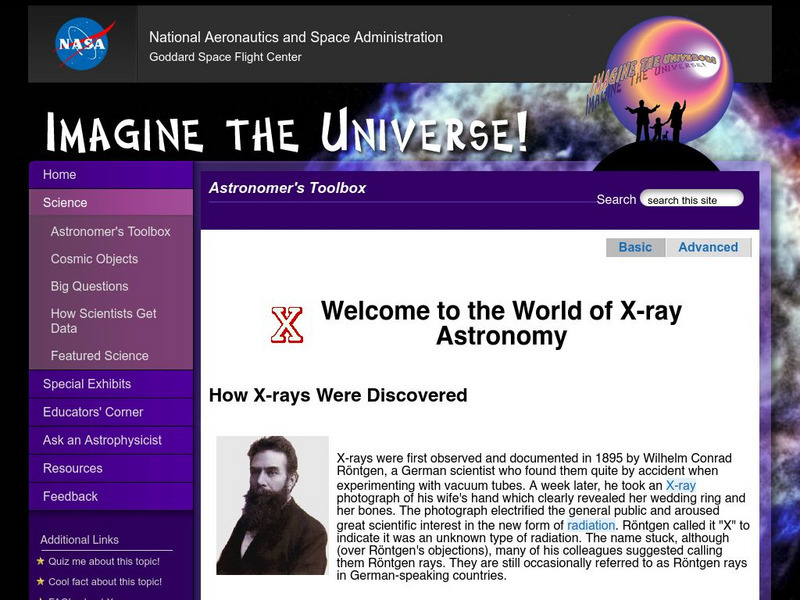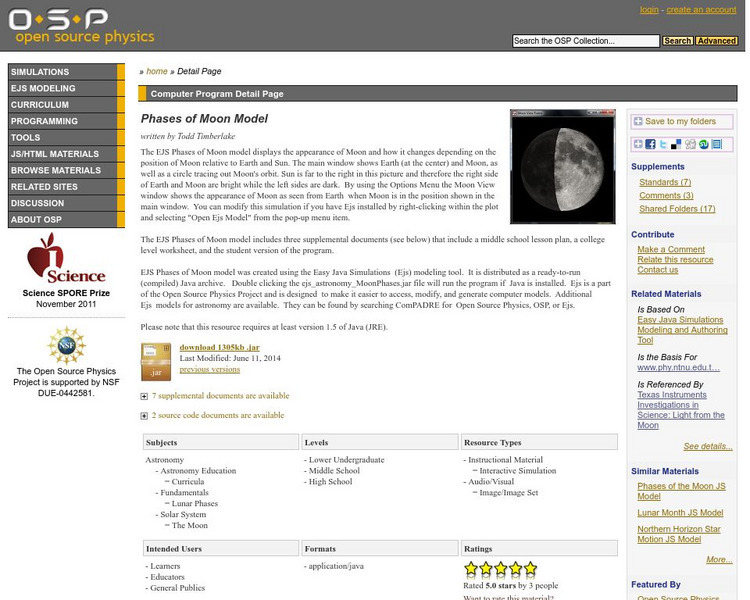Weber State University
The Sun and the Seasons
Why is there more daylight in June than in December if you live above the equator? How does the angle of sunlight shift throughout the year? Answer these questions and more with an interactive article about the sun, its path through the...
CK-12 Foundation
Ck 12: Earth Science: Branches of Earth Science Study Guide
Review the main study areas of Earth Science.
CK-12 Foundation
Ck 12: Earth Science: Revolutions and Rotations of the Earth Study Guide
[Free Registration/Login may be required to access all resource tools.] Summarizes the key points about how our understanding of the Earth's movements evolved from ancient times and what we know today. Includes some questions to check...
American Association of Physics Teachers
Com Padre Digital Library: Open Source Physics: Earth Orbit Model
Nicolaus Copernicus developed the theory of Earth's orbit around the sun demonstrated in this science simulation.
NASA
Nasa: Image Science Center: Ask the Space Scientist
A NASA scientist, Dr. Sten Odenwald, answers many students' questions. Topics include planets, galaxies, black holes, the origin of the universe, and common misconceptions about space.
Cool Math
Coolmath: Science Monster: Earth
Read about the vital statistics, composition, and other facts about our home planet, Earth.
Cool Math
Coolmath: Science Monster: Pluto
A cool fact sheet about Pluto including a place for students to enter their weight on Earth to convert it to what it would be on Pluto.
Cool Math
Coolmath: Science Monster: Uranus
A cool fact sheet about Uranus including a place for students to enter their weight on Earth to convert it to what it would be on Uranus.
Cool Math
Coolmath: Science Monster: Saturn
A cool fact sheet about Saturn including a place for students to enter their weight on Earth to convert it to what it would be on Saturn.
Cool Math
Coolmath: Science Monster: Neptune
A cool fact sheet about Neptune including a place for students to enter their weight on Earth to convert it to what it would be on Neptune.
Cool Math
Coolmath: Science Monster: Jupiter
A cool fact sheet about Jupiter including a place for students to enter their weight on Earth to convert it to what it would be on Jupiter.
Cool Math
Coolmath: Science Monster: Mercury
A cool fact sheet about Mercury including a place for students to enter their weight on Earth to convert it to what it would be on Mercury.
Ducksters
Ducksters: Astronomy for Kids: Constellations
Kids learn about the constellations in the science of astronomy. These stars that form patterns when viewed from the Earth have been studied since ancient times.
Ducksters
Ducksters: Astronomy for Kids: Sunspots, Solar Winds, and Flares
Kids learn about sunspots, solar winds, and solar flares in the science of astronomy. What they are and how they affect Earth.
NASA
Nasa: Imagine the Universe: Welcome to the World of X Ray Astronomy
Site recounts how X-rays were discovered as well as who discovered them. Offers graphics, links to facts on this topic, a quiz, and teacher resources.
Cool Math
Coolmath: Science Monster: Our Moon
Read about our planet's only satellite, better known as the moon in this colorful, illustrated tutorial.
University of Virginia
University of Virginia: How the Greeks Used Geometry to Understand the Stars
An article explaining how the Greeks were able to use their science and mathematics to predict where astronomical objects such as the Planets could be found in the nighttime sky even though their underlying premise was that the earth did...
American Association of Physics Teachers
Com Padre Digital Library: Open Source Physics: Phases of the Moon Model
Examine the changes that occur with the moon's movement in relationship to the Earth and Sun with this astronomy simulation.








